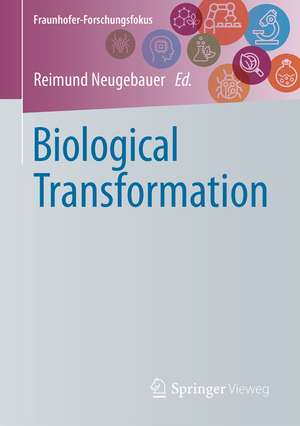Biological Transformation
Editat de Reimund Neugebaueren Limba Engleză Paperback – 13 sep 2021
In terms of taking responsibility of the good of all people, biological transformation is therefore a path that applied research will have to take. The Fraunhofer-Gesellschaft has recognized the developmental technology potential of biological transformation and sees it as its task not only to drive the relevant research forward, but also to promote public awareness of the topic.
Preț: 557.50 lei
Preț vechi: 688.26 lei
-19% Nou
Puncte Express: 836
Preț estimativ în valută:
106.67€ • 111.38$ • 88.29£
106.67€ • 111.38$ • 88.29£
Carte tipărită la comandă
Livrare economică 31 martie-07 aprilie
Preluare comenzi: 021 569.72.76
Specificații
ISBN-13: 9783662596616
ISBN-10: 366259661X
Pagini: 398
Ilustrații: XIII, 398 p. 155 illus.
Dimensiuni: 148 x 210 mm
Ediția:1st ed. 2020
Editura: Springer Berlin, Heidelberg
Colecția Springer Vieweg
Locul publicării:Berlin, Heidelberg, Germany
ISBN-10: 366259661X
Pagini: 398
Ilustrații: XIII, 398 p. 155 illus.
Dimensiuni: 148 x 210 mm
Ediția:1st ed. 2020
Editura: Springer Berlin, Heidelberg
Colecția Springer Vieweg
Locul publicării:Berlin, Heidelberg, Germany
Cuprins
From contrast to convergence - biological principles shape the technologies of tomorrow.- Biological transformation - a research agenda of the Fraunhofer-Gesellschaft- Bionics research for medical technology.- Innovative food products.- Technical habitats for human cells.- Phenotyping and genotyping of plants.- Cells as sensors.- Biopolymers - versatile function carriers in interdisciplinary materials research.- Biogenic plastic additives.- Organisms as producers.- Biologized robotics and biomechatronics.- Future AM.- Insect biotechnology.- The resource principle.- Cognitive biological sensors.- Prevention of biofouling.- Urban agriculture.- Digital villages.- Alternatives to growth.
Notă biografică
Prof. Reimund Neugebauer is the 10th president of the Fraunhofer-Gesellschaft. He took office on October 1, 2012 and is responsible for the executive board division “Corporate policy and research”.
Textul de pe ultima copertă
The global population is expected to rise to 9.8 billion by the year 2050 - with everyone ultimately striving for prosperity. New methods must therefore be found to achieve more efficient production. Research to date shows that the biological inventory that has evolved: its products, processes, principles and tools, can spur modern technology. The development of technological innovations based on biological concepts, with the goal of particularly innovative and sustainable value creation, today is collectively known as "biological transformation". It results in highly functional products with striking properties that can be both manufactured and utilized in a resource-saving way.
In terms of taking responsibility of the good of all people, biological transformation is therefore a path that applied research will have to take. The Fraunhofer-Gesellschaft has recognized the developmental technology potential of biological transformation and sees it as its task notonly to drive the relevant research forward, but also to promote public awareness of the topic.
The Editor
Prof. Reimund Neugebauer is the 10th president of the Fraunhofer-Gesellschaft. He took office on October 1, 2012 and is responsible for the executive board division “Corporate policy and research”.In terms of taking responsibility of the good of all people, biological transformation is therefore a path that applied research will have to take. The Fraunhofer-Gesellschaft has recognized the developmental technology potential of biological transformation and sees it as its task notonly to drive the relevant research forward, but also to promote public awareness of the topic.
Caracteristici
Describes digital and biological transformation as convergent processes Explores the use of biological systems in goods manufacture Describes how biological models, principles and processes are adopted in the resource-efficient, networked manufacture of highly functional products
